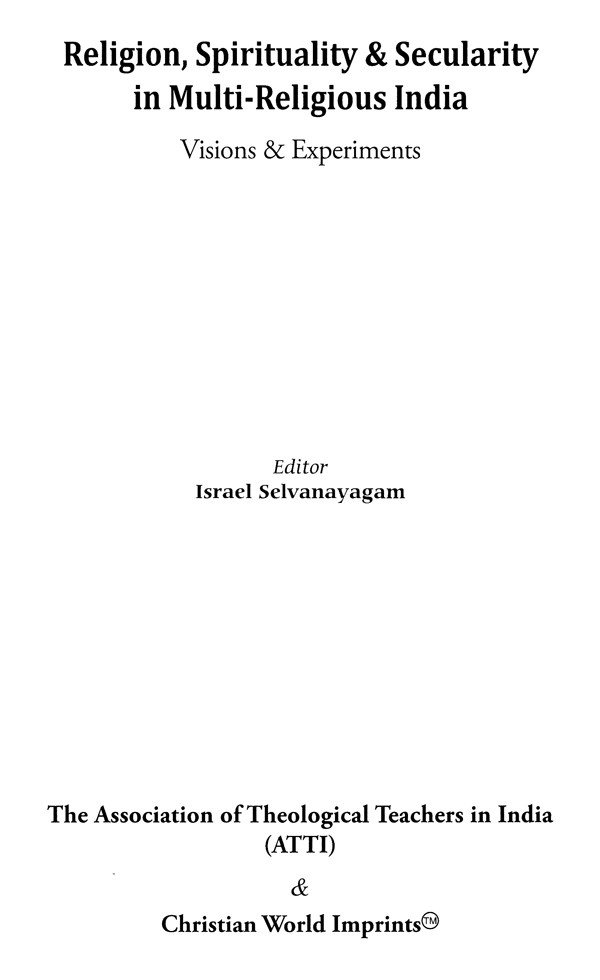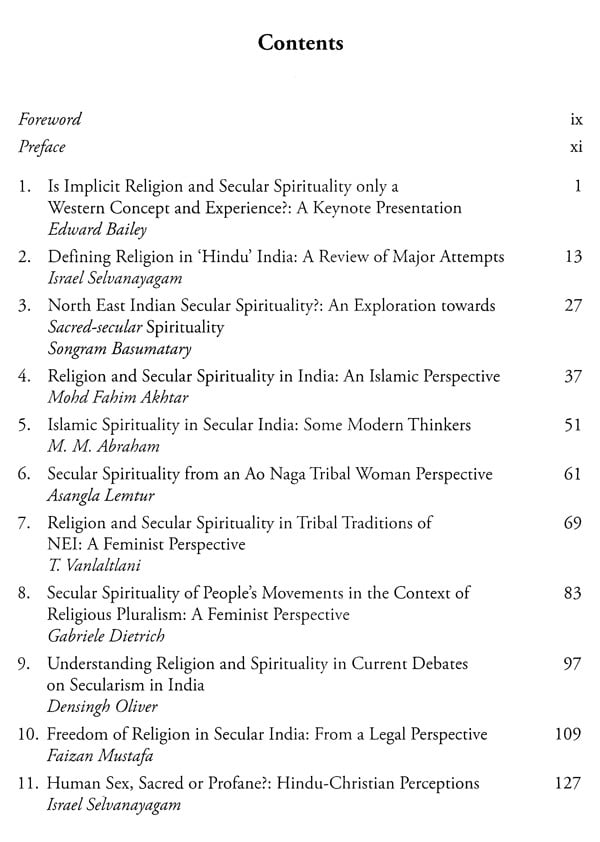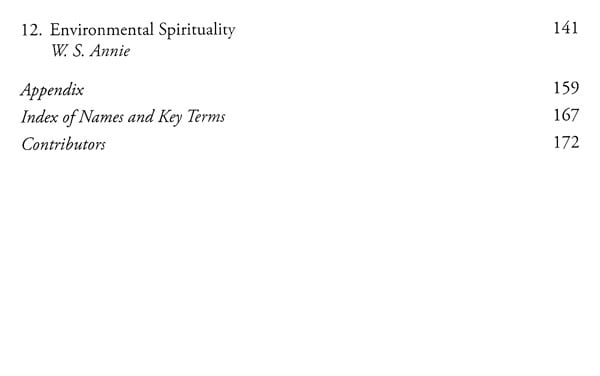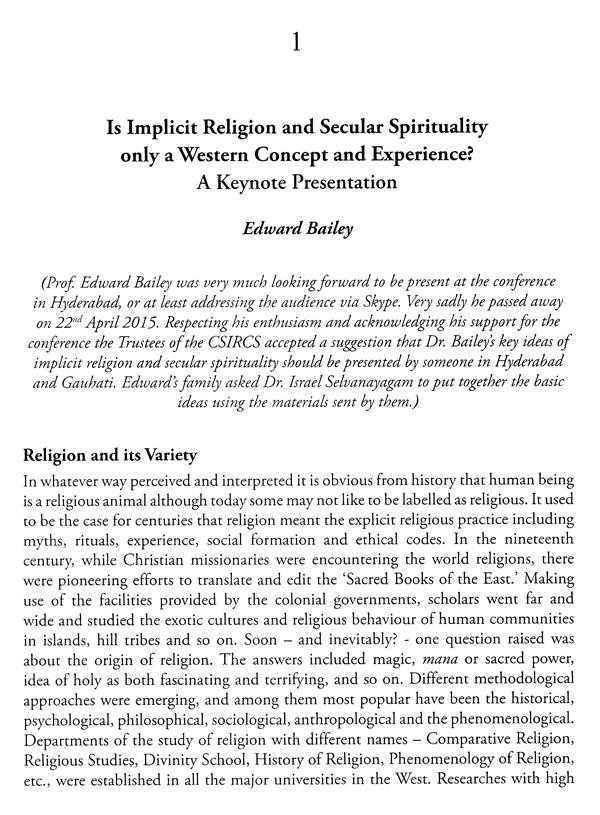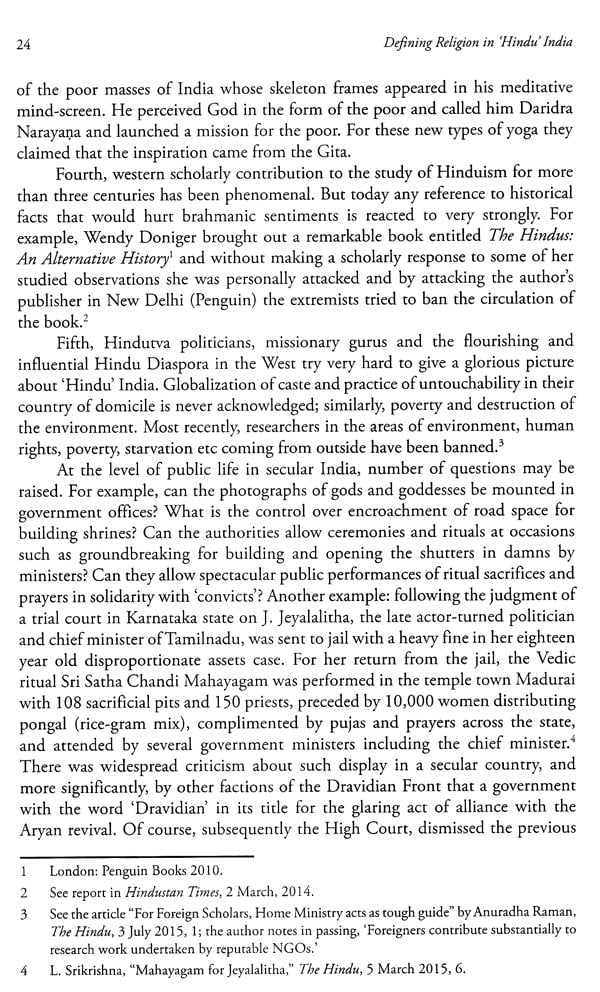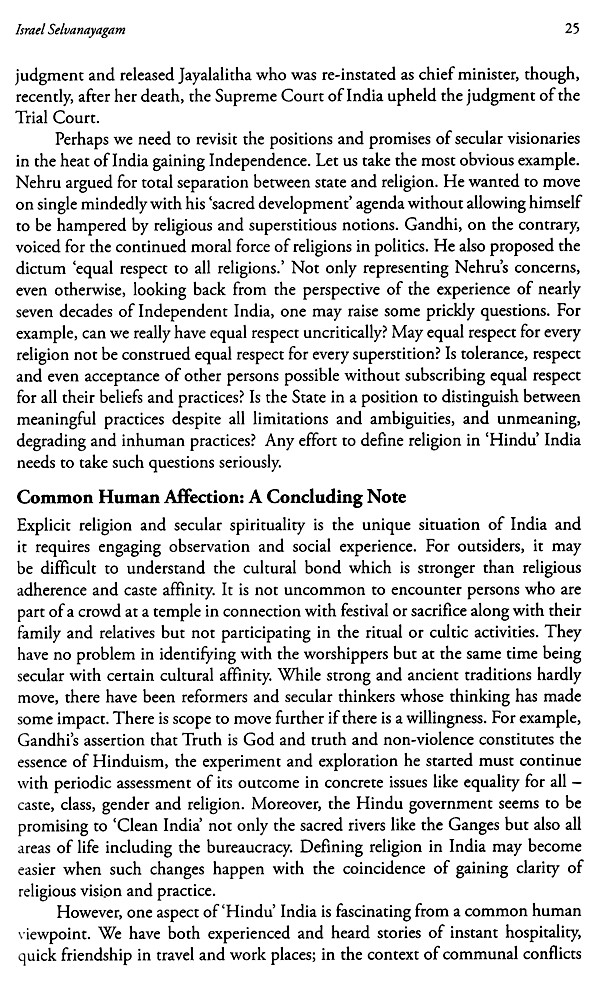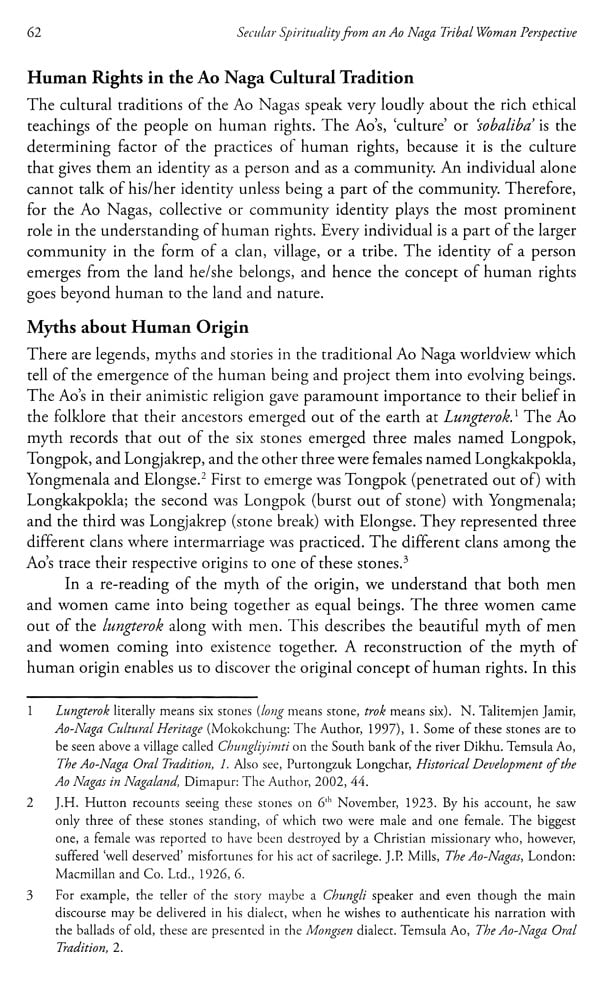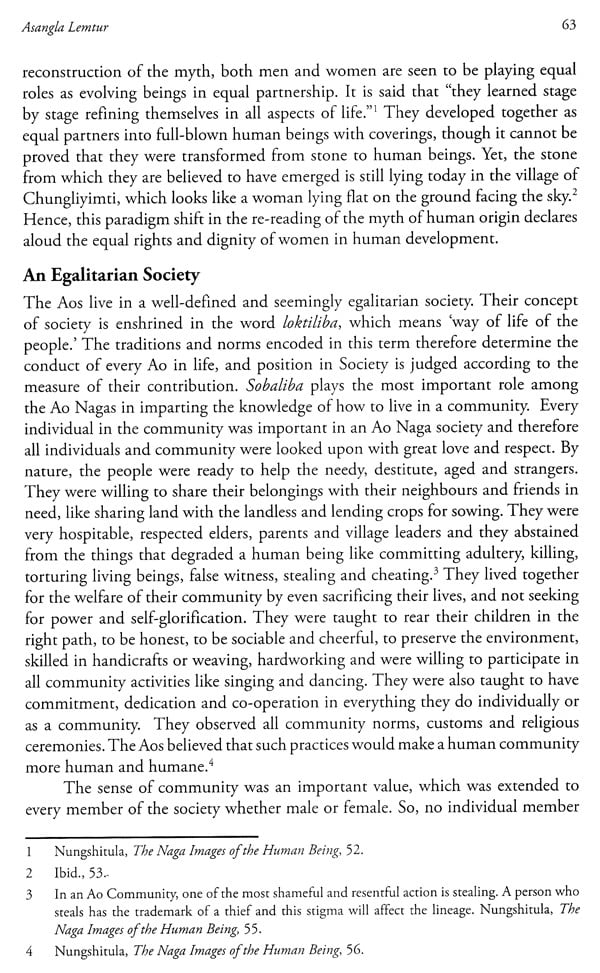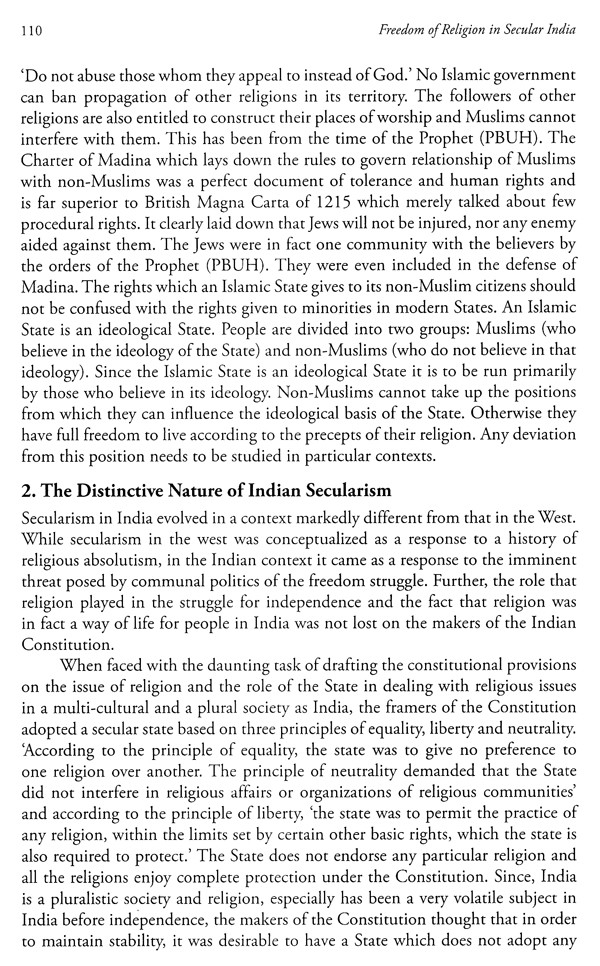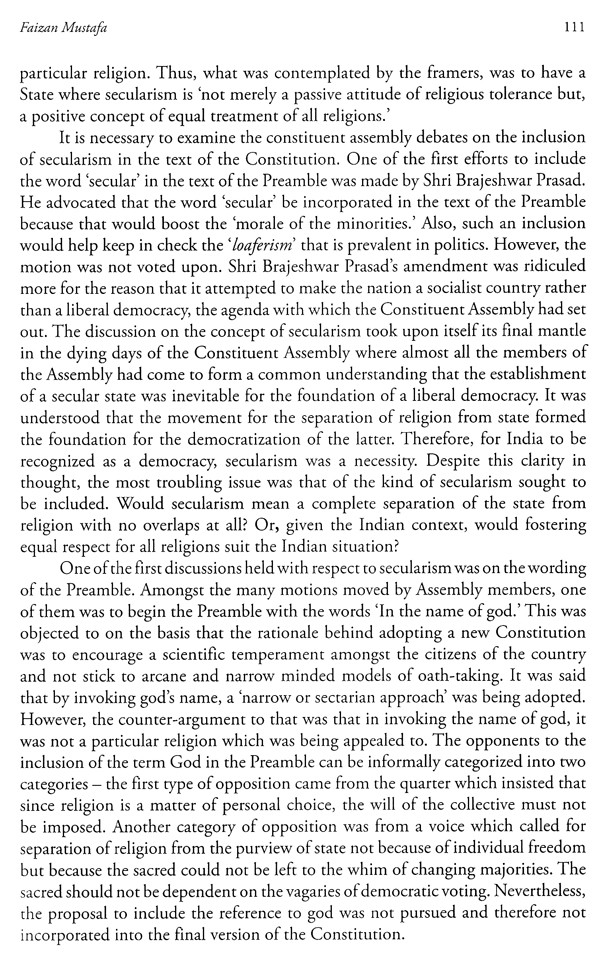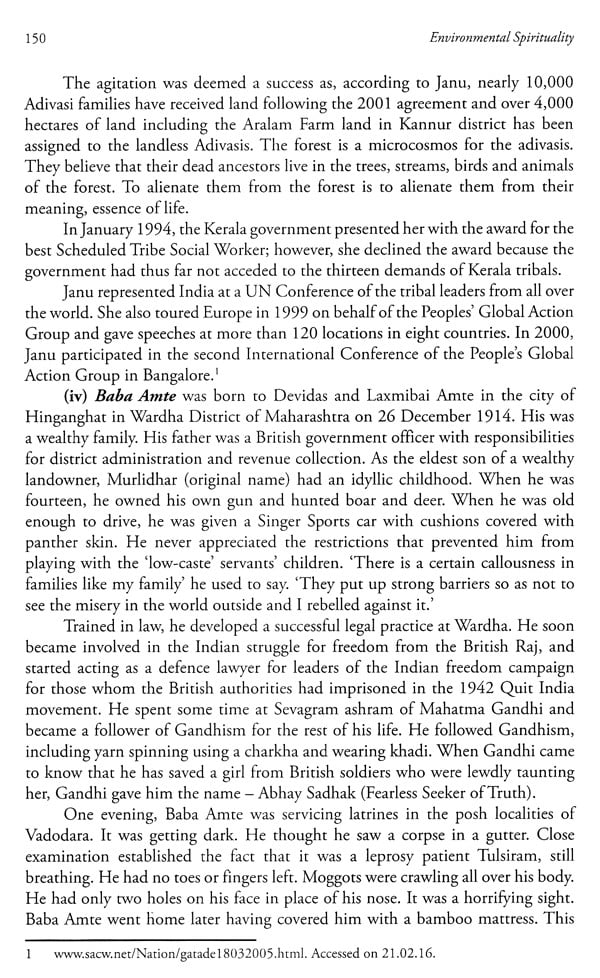
Religion, Spirituality & Secularity in Multi-Religious India (Visions & Experiments)
Book Specification
| Item Code: | UAZ455 |
| Author: | Israel Selvanayagam |
| Publisher: | The Association of Theological Teachers in India & Christian World Imprints |
| Language: | English |
| Edition: | 2017 |
| ISBN: | 9789351482130 |
| Pages: | 196 |
| Cover: | HARDCOVER |
| Other Details | 9.50 X 6.50 inch |
| Weight | 500 gm |
Book Description
However complex and mysterious, religion in some form is integral to human life as evident in history and therefore cannot be divorced from study and analysis. The alternative term 'spirituality' appeared to ward off the ambiguous characters of religion, but it has not proved to be less complex. Explicit religions claim to possess the resources of spirituality while often maintaining a dichotomy between spiritual and material. An alternative understanding of spirituality is presented as permeating all aspects of life. The concept of implicit religion and secular spirituality, unlike the established religion, is exploratory with open boundary. However, it cannot remain a concept in the intellectual realm but be applied to contexts like India where religious life is vibrant within a secular polity where struggle for legal and eco-justice continues.
The essays of this book provide a commentary on these issues. Further, insights, instincts and impulses to work for change at great personal risks deserve an in-depth exploration.
Rev. Dr. Israel Selvanayagam, a presbyter from the Church of South India, has taught Religion, Hinduism and Interfaith Relations in many colleges/seminaries in India and in the United Kingdom. Currently, he is with the Methodist Church in Britain, based in Evesham. He has published extensively both in Tamil and English. His last major book is, Kristu Bhakti and Krishna Bhakti: A Christian- Hindu Dialogue Contributing to Comparative Theology, CWI, 2017.
The history and background of the production of this book may be very interesting. It was in September 1996, I started to teach at the Wesley College, Bristol, England. Being new to the situation, I was exploring particularly avenues of theological discussions. I was pleased to discover that there was the Bristol Theological Society. For that academic term, their first session was in the Baptist College on a Monday evening of the same month. According to the agreement of my appointment, every Monday I was scheduled to teach at Queens College, Birmingham. This particular Monday, I rushed by train to be in time for the theological seminar. From the Temple Meads station, I took a taxi to the Baptist College. But only on arrival I realized that taxi wallas would not accept credit cards and I felt embarrassed. After a while a person with clerical collar appeared who was walking towards the building. I approached him and told him of my plight. He gave the necessary amount and I noted his address. Next morning, I sent a cheque with a thank-you note which impressed him!
The clergyman was Edward Bailey, the longstanding Rector of St. Michael parish church in Winterbourne, a suburb of Bristol. Visits between our two families were exchanged. Edward was most passionate when he shared the story of establishing what was then known as the Centre for the Study of Implicit Religion and Contemporary Spirituality. I do not want to repeat the story here as he has detailed it in the first chapter of this book. Also, he had special interest in India where he spent more than a year (1959-60) in preparation for his priestly training, based at the United Theological College, Bangalore where Russel Chandran was the Principal. He visited the adjacent institution, Christian Institute for the Study of Religion and Society, Bangalore and regularly consulted P. D. Devanandan and M. M. Thomas who developed ideas about the theological significance of Asian revolution and Indian renaissance with the western impact of secularism. Obviously, Edward was influenced by those theologians who found in genuine secularism, a medium of God's continuing revelation.
Professor Baily was not only interested in the academic study of society and spirituality, but also had a pastoral heart and social concern. When I introduced the Rural Development Movement of my village, he raised contributions through his church as well as St. Michael's School over which he had pastoral charge. He organized events at his home and invited me to preach few times at his services. Because of long years of remaining in the same place he came to be regarded as a friend of his parishioners and leader of the local community.
I am so glad that the papers presented at the two Conferences on Implicit Religion and Secular Spirituality in India (held in Hyderabad and Gauhati in August and November 2016 respectively) are being published by the Association of Theological Teachers in India (ATTI). It is very good that the Revd. Dr. Israel Selvanayagam used his tenure as the President of ATTI to organize these conferences and to encourage the writing of these papers on a topic that has thus far not been, as far as I am aware, much researched in India. These papers are an important addition to the body of literature on the whole question of the forms of religion' and 'spirituality' that at first glance are not within the ambit of what one would normally study as religion and spirituality.
The concept of Implicit Religion and Secular Spirituality brings to the fore the fact that a very large number of people in India have 'ultimate commitments' and 'integrating foci' that are not the usual ones associated with Indic religions and spirituality but may be things like, cricket, the nation-state or even naturopathy. Their whole life revolves around these foci and their commitment to them orders their lives in a way that for conventionally religious people, God, Scripture and Ritual may do. Further, research into what the religious themes may be in seemingly secular things like films or plays is a very valid exercise and I pray that this volume may just be the first in a series of studies of implicit religion and secular spirituality in India and perhaps later in South Asia as well.
The research of Dr. O.L. Snaitang is an effort to understand the role of Christianity in national integration and nation building. Whereas Christianity is a faith observed by large numbers in India, it was and continues in some sense to be looked upon in the region from the perspective of western Christianity. Snaitang's study traces the beginnings of this history from the earliest efforts of Christian missionaries, the peoples' response, and brings this narrative to more recent times. Incorporated in the text are the contributions made by the churches to education and literature, medical service, other humanitarian services and peace initiatives. The role played by the indigenous leaders in the continued grown of the churches in what may be considered the second phase of this development is another focus. Backed by impressive primary and secondary sources, the scholarship and interpretation of the author, Christianity and National Integration in Northeast India will add to our understanding of North East India.
The Sixteenth Century Reformation is considered by historians as next to the introduction of Christianity. In fact, it was like relaunching of Christianity itself and Luther not only was a reformer, but a Messiah of Christian faith and Christian theology. For Luther with his revolutionary transforming vision brought a Copernicus Revolution like turn around in the Christianity. He brought almost complete paradigm shift in Christian doctrine and theology. The Church was never the same as before, theology was never again static after Luther.
Beside religious realm, the Reformation movement also impacted upon the culture and civilization of western world and beyond. The Reformation in general and Luther in particular, directly or indirectly provided an immense impulse and a propelling force to every forward movement towards modern world and human civilization. Luther, a theologian, a pastor and a preacher managed to excite every sections of people in his time to look for better world. Even five hundred years after, he continues to challenge and inspire, theologians, pastors, preachers, revolutionaries, politicians, social scientists, economists, psychologists, playwrights, musicians, etc.
What made Reformation and Luther such influential and never dying inspiration to people generation after generation? Answer to this question perhaps lies neither in the greatness of reformation nor in the heroic work of Luther. Instead, it is solely on the ecclesiological and societal contexts and situations peoples face. It is the context and situation that demand and recall the spirit of reformation and the revolutionary theology of Luther. For the context and situation of Church and society time and again revolves back to the context and situation of Sixteenth Century. We could see the same context and situation in the Church and society of our times.
**Contents and Sample Pages**
